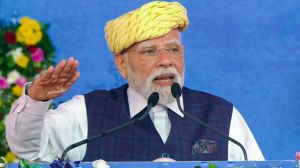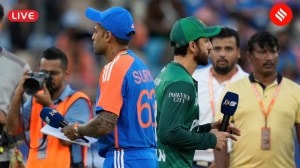"What more can be done? Election Commission cannot create law": M S Gill
In the last two years since he took over as the Chief Election Commissioner, Manohar Singh Gill has piloted the Commission through two gener...

In the last two years since he took over as the Chief Election Commissioner, Manohar Singh Gill has piloted the Commission through two general elections in 1996 and 1998, elections in Jammu and Kashmir, in Punjab, a Presidential election, and elections to the Rajya Sabha. Today, as he prepares for the November 25 assembly elections in Delhi, Rajasthan, Madhya Pradesh and Mizoram, he as head of the Commission finds himself once again acting as the referee in implementing the model code of conduct.
The Commission has just rapped the Centre on the knuckles for carrying petroleum ministry ads extolling the achievements of the government. Snowed under by faxes, petitions, last-minute instructions, and numerous meetings as D-day approaches, Gill took time off at his Nirvachan Sadan headquarters to answer the questions NIRMALA GEORGE put to him.
Political differences have sharpened and there has been a perceptible change in campaign culture. This is reflected in the sharp attacks of thepolitical parties on each other. How does the EC view this?
Over the years one thing has become clear the political temperatures have been going up. The reasons for this are obvious. In 50 years, the electorate has grown from 30 crore to nearly 100 crore. Every segment is aware of its rights, it wants its share of the cake, and often the whole cake itself. Obviously, the Commission will have to be more alert to keep the peace.
In the last five years there has been a greater delineation of the rules of the electoral game. But has it helped?
For the last few years the Commission has been working very hard to map out the “code of conduct” as it is called, or how the parties should conduct themselves in a democratic exercise such as elections. Simply put, the model code amounts to this — how to ensure fairness between all contesting parties, taking particular care of the opposition since those in power in a given place naturally have the opportunity to help themselves.
The boundaries arenot clearly marked. There is no lakshman rekha. There can’t be one. That is why during an election the Commission is constantly on the alert. I keep getting vast loads of faxes and every issue has to be addressed carefully. The Commission has to be particularly careful about two things — that the legitimate political process is not throttled and that all legitimate developmental activity is not blocked once elections are notified and the code of conduct comes into effect. Therefore, we agonise over every request or every challenge.
So how do you draw the line?
What we try to stop is the advantage the ruling party tries to take in the name of development. I think by now the political parties and the Commission understand the parameters. I have to also emphasise at this point that all the recognised national political parties, all 43 of them, at the highest levels are in touch with us and consult us before taking any major step.
Invariably they heed our advice. This includes all chiefministers, without exception.
The Commission has been highlighting the issue of criminalisation of politics. Yet EC still doesn’t seem to have come to grips with the problem.
On this matter, the Commission is very clear. We have to obey the Constitution, the laws made by Parliament under the Constitution and the elaboration of those laws in any judgments of the Supreme Court and the courts. We stay within those parameters. Section 8A of the Representation of People Act, 1951, which relates to criminalisation lists certain offences under which, if you are convicted, you cannot stand for public office for a period of six years.
Earlier, if the case went into appeal, and the appeal process could take years, then the candidate could stand for elections. Now the Commission has changed that. The current regulation is very clear and has been accepted by all parties: if you are convicted, even if you have appealed to a higher court, then you cannot stand for elections. This is a great stepforward.
Secondly, candidates have to furnish a sworn affidavit giving information on their background. And if the information in the affidavit turns out to be false, the candidate can be taken to court. This rule is being followed for the last one year by all the candidates. What more can be done? The Commission cannot create law.
But in a new initiative we have communicated a proposal to all parties, all MPs, and to the Home and Law ministeries, that in specified offences where the accused person is liable to a jail term of at least five years if convicted, and if in such offences the case has been taken to the police and the judge has found that a prima facie case exists, then that should be good enough reasons to block his/her political candidature.
We are requesting that Parliament should make this law at the earliest, and we believe that it will be upheld by the courts.
Why do states invariably ask for the deployment of Central forces rather than rely on the state police?
To my mind, itis a bad sign that after 50 years of democracy every state and every political party requisitions more and more Central forces during election time. This means that all of them do not have faith in the impartiality of the state police. If you have to bring lakhs and lakhs of police personnel from the Centre, think of the money and time involved. This is a poor comment on the state police.
If there is the apprehension that the state police forces are not impartial, then the parties have to take the blame for mishandling the police. Isn’t it time to stop this? That’s why you need neutral administrations at election time. Given half a chance, the civil administration and police want to do the right thing. But they have to be allowed to function. Many of them speak of the unacceptable pressure from the governments. So let us take corrective action on resolving this first.
This election campaign has come to be associated with the humble onion, hasn’t it?
It is an encouraging sign that people areconcerned about prices and economic issues and not on religious issues. Parties should focus on the economy, on ensuring the basic necessities for the people in the future.
People should take the manifestos of the parties seriously, so that they can be held to task to implement their manifestos once the party is elected to office.
Photos



- 01
- 02
- 03
- 04
- 05




























